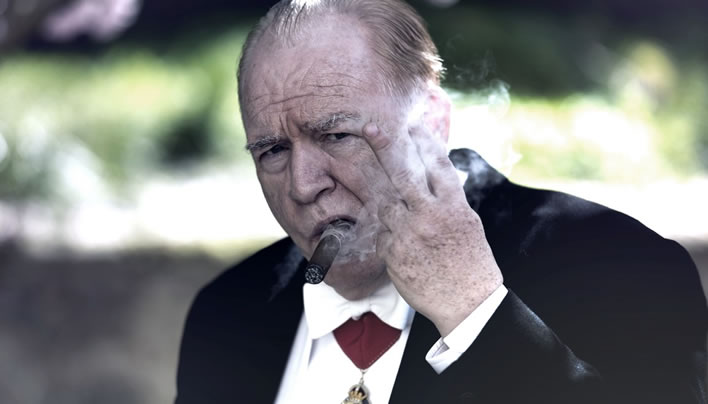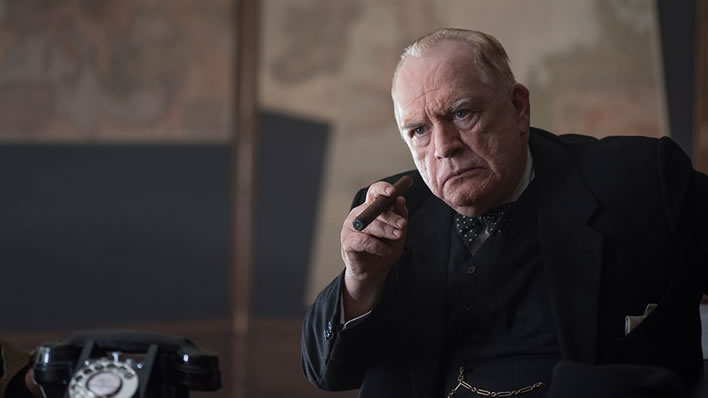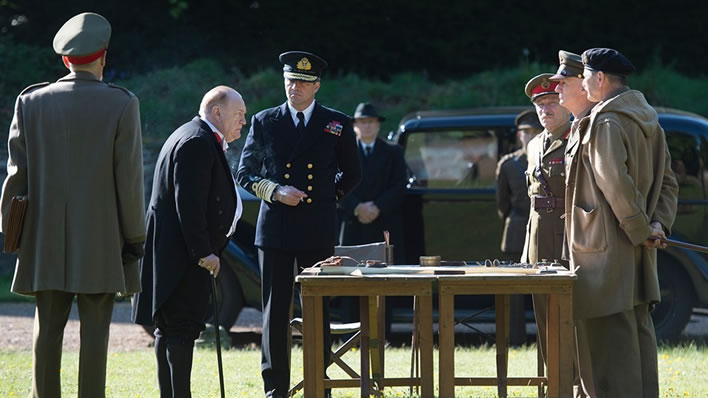The wartime prime minister – shaken and stirred
Werner Vogt, UTC 2017-06-08 10:53
In his biopic of the former British Prime Minister Winston Churchill the Australian director Jonathan Teplitzky displays an almost frivolous treatment of historical facts.

Churchill giving us two fingers, played by Brian Cox. Photo by Cohen Media Group, ©Cohen Media Group 2017.
Her Majesty's best secret agent 007 is a fictional figure, which is completely acceptable when the action in the Bond films is like the vodka-martini: shaken, not stirred. Not acceptable, on the other hand, is when in a film about a giant of history, fantasy and truth are put in the shaker to produce a strange pseudo-historical cocktail.
Jonathan Teplitzky's film Churchill is set in the ten days around D-Day, the Allied landings in Normandy on 6 June 1944. It is, in fact, a studio film with a good dozen recognizable actors, about the same number of supporting players and scarcely an extra (London, at least the little that one sees of it, is a ghost town).
In the few outdoor scenes there are, Churchill is seen walking along empty beaches or driving along deserted country roads. So far, so good. Clearly the director had only limited funds available, in contrast to Steven Spielberg, say, who in Saving Private Ryan could spend twelve million dollars alone on the bloody opening scene, the landing of the US infantry on Omaha Beach.
A wreck of a human being?
Teplitzky's film doesn't even attempt to show us the gigantic deployment of 1.5 million soldiers, airmen and sailors, the involvement of 7,000 ships, 4,000 fighter aircraft, 4,000 bombers and 3,000 transport planes. His Churchill is a psychological drama revolving around the British wartime prime minister and his role immediately before, during and immediately after the greatest amphibious landing in the history of the world.

Churchill, played by Brian Cox. Photo by Cohen Media Group, ©Cohen Media Group 2017
If you believe the film, a few days before the Allied landings in Normandy Churchill attempted to stop this gigantic military operation on the grounds that it would lead to the same debacle as the Allied landing in Gallipoli in the Dardanelles in 1915, which ended in a catastrophe and forced Churchill's resignation as First Lord of the Admiralty. Furthermore, Teplitzky's Churchill is a frail old man, eaten up with depression and alcohol, an uncontrollable tyrant to his wife and his closest staff, whether field marshal or secretary. Indeed, even worse, an effectively mentally incompetent psycho.
Responsible for this outrageous nonsense, besides the director, is the author of the screenplay, Alex von Tunzelmann, who – we read on her homepage not without some surprise – studied History at Oxford. No one is objecting to a broad-brush approach to history for film-goers. But at some point poetic licence has its limits.
Annoying errors
It is mainly to the credit of Winston Churchill that London withstood the assault of the Nazis in 1940. In doing that he was well-known as an egomaniac, a micromanager of the worst sort for his General Staff and, yes, he drank between too much and much too much alcohol and had a problem with bouts of depression. These last, however – and here the film makes a wicked historical distortion – occured in phases of personal defeats and career breaks.
The reality could not be more different: before D-Day Churchill was fired up on adrenaline and would have preferred to have been on a ship off the French coast. In this last point the film is correct. Irritating, however, are the supposedly small details, such as when the Commander-in-Chief of Operation Overlord greets the Prime Minister with 'Hello, Churchill', or when in his presence he calls him, even though under his breath, an 'arsehole'. 'Ike' would never have allowed himself such a casual tone or have used such an outrageous insult.

Churchill in dress suit meeting his generals in a field. The smoking admiral clearly put his cap on in a high sea. Photo by Cohen Media Group, ©Cohen Media Group 2017
What are the performances like in Churchill? Mediocre (resulting from the script) in the case of Churchill (Brian Cox) and his wife Clementine (Miranda Richardson), below average in the case of General Montgomery (Julian Wadham) and General Eisenhower (John Slattery), better in the case of General Smuts (Richard Durdan) and a rare glimmer of light in the case of the secretary Helen Garrett (Ella Purnell).
Despite all that, Churchill is worth seeing, if only that we subsequent generations, who were able to grow up in freedom, never forget that millions of soldiers sacrificed their lives for this freedom and that leaders such as Churchill had sleepless nights with the thought that in the first wave of the attacks in Normandy 10,000 from around 170,000 soldiers died. That was the real cost in blood for the Allies on the 'Longest Day'.
This article was written by Dr. Werner Vogt. The German version appeared in the Neue Zürcher Zeitung on 3 June 2017. This translation ©FoS 2017.
0 Comments UTC Loaded:
Input rules for comments: No HTML, no images. Comments can be nested to a depth of eight. Surround a long quotation with curly braces: {blockquote}. Well-formed URLs will be rendered as links automatically. Do not click on links unless you are confident that they are safe. You have been warned!